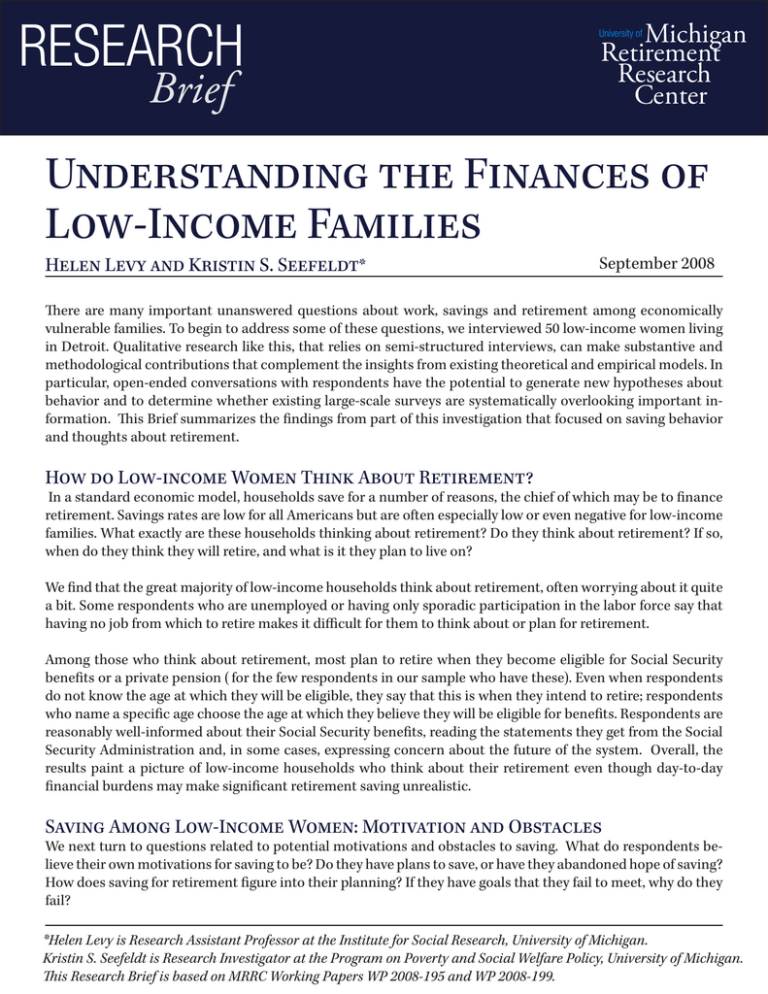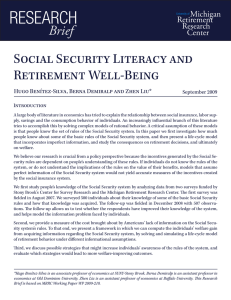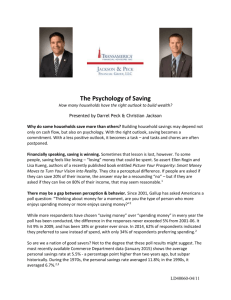ReseaRch Understanding the Finances of Low-Income Families Brief
advertisement

ReseaRch Brief Michigan Retirement Research Center University of Understanding the Finances of Low-Income Families Helen Levy and Kristin S. Seefeldt* September 2008 There are many important unanswered questions about work, savings and retirement among economically vulnerable families. To begin to address some of these questions, we interviewed 50 low-income women living in Detroit. Qualitative research like this, that relies on semi-structured interviews, can make substantive and methodological contributions that complement the insights from existing theoretical and empirical models. In particular, open-ended conversations with respondents have the potential to generate new hypotheses about behavior and to determine whether existing large-scale surveys are systematically overlooking important information. This Brief summarizes the findings from part of this investigation that focused on saving behavior and thoughts about retirement. How do Low-income Women Think About Retirement? In a standard economic model, households save for a number of reasons, the chief of which may be to finance retirement. Savings rates are low for all Americans but are often especially low or even negative for low-income families. What exactly are these households thinking about retirement? Do they think about retirement? If so, when do they think they will retire, and what is it they plan to live on? We find that the great majority of low-income households think about retirement, often worrying about it quite a bit. Some respondents who are unemployed or having only sporadic participation in the labor force say that having no job from which to retire makes it difficult for them to think about or plan for retirement. Among those who think about retirement, most plan to retire when they become eligible for Social Security benefits or a private pension ( for the few respondents in our sample who have these). Even when respondents do not know the age at which they will be eligible, they say that this is when they intend to retire; respondents who name a specific age choose the age at which they believe they will be eligible for benefits. Respondents are reasonably well-informed about their Social Security benefits, reading the statements they get from the Social Security Administration and, in some cases, expressing concern about the future of the system. Overall, the results paint a picture of low-income households who think about their retirement even though day-to-day financial burdens may make significant retirement saving unrealistic. Saving Among Low-Income Women: Motivation and Obstacles We next turn to questions related to potential motivations and obstacles to saving. What do respondents believe their own motivations for saving to be? Do they have plans to save, or have they abandoned hope of saving? How does saving for retirement figure into their planning? If they have goals that they fail to meet, why do they fail? *Helen Levy is Research Assistant Professor at the Institute for Social Research, University of Michigan. Kristin S. Seefeldt is Research Investigator at the Program on Poverty and Social Welfare Policy, University of Michigan. This Research Brief is based on MRRC Working Papers WP 2008-195 and WP 2008-199. In spite of a great deal of interest in understanding the determinants of savings rates, particularly for low-income households, almost no research has asked members of those households what they think is going on and how they think about saving (or not). We find that these households wish that they could save, and say that they plan to do so in the future when they hope to have more income. They identify many motives for saving, including the desire to have a cushion in case of the unexpected (a precautionary motive), wanting to put their children through college, saving up for a house or car. A few respondents mention wanting to start a small business. Some see this saving as complementary to retirement saving, since they plan to supplement their retirement income (which will in most cases be only what they receive from Social Security) by running a small business like a Laundromat or a catering business. Very few respondents volunteer “retirement” as a motivation for saving although when we ask specifically about retirement planning, the majority of our respondents say that they think about retirement and would like to save for it. In fact, a significant minority of our respondents are saving for retirement through either 401K plans or employer-provided pensions, although the amounts in 401K do not seem to be large. A number of respondents have been forced to dip into 401K savings to pay living expenses during a long unemployment spell or in order to help friends or relatives. In fact, friends and family surface as a major obstacle to saving for our respondents. Those who have liquid assets are asked for help. Conversely, many of our respondents are the beneficiaries of gifts or other support (such as free housing) from friends and relatives. These complicated patterns of resource-sharing have clear benefits for the low-income population overall, providing a mechanism for smoothing consumption analogous to consumption insurance in developing economies. At the same time, however, they imply that significant asset accumulation is unlikely unless these assets are illiquid – for example, employer-provided pensions. University of Michigan Retirement Research Center Institute for Social Research 426 Thompson Street Room 3026 Ann Arbor, MI 48104-2321 Phone: (734) 615-0422 Fax: (734) 615-2180 mrrc@isr.umich.edu www.mrrc.isr.umich.edu The research reported herein was performed pursuant to a grant from the U.S. Social Security administration (SSA) through the Michigan Retirement Research Center (MRRC). The findings and conclusions expressed are solely those of the author(s) and do not represent the views of SSA, any agency of the federal government, or the MRRC. Regents of the University of Michigan Julia Darrow, Laurence B. Deitch, Olivia P. Maynard, Rebecca McGowan, Andrea Fischer Newman, Andrew C. Richner, S. Martin Taylor, Katherine E. White, and Mary Sue Coleman, ex officio






